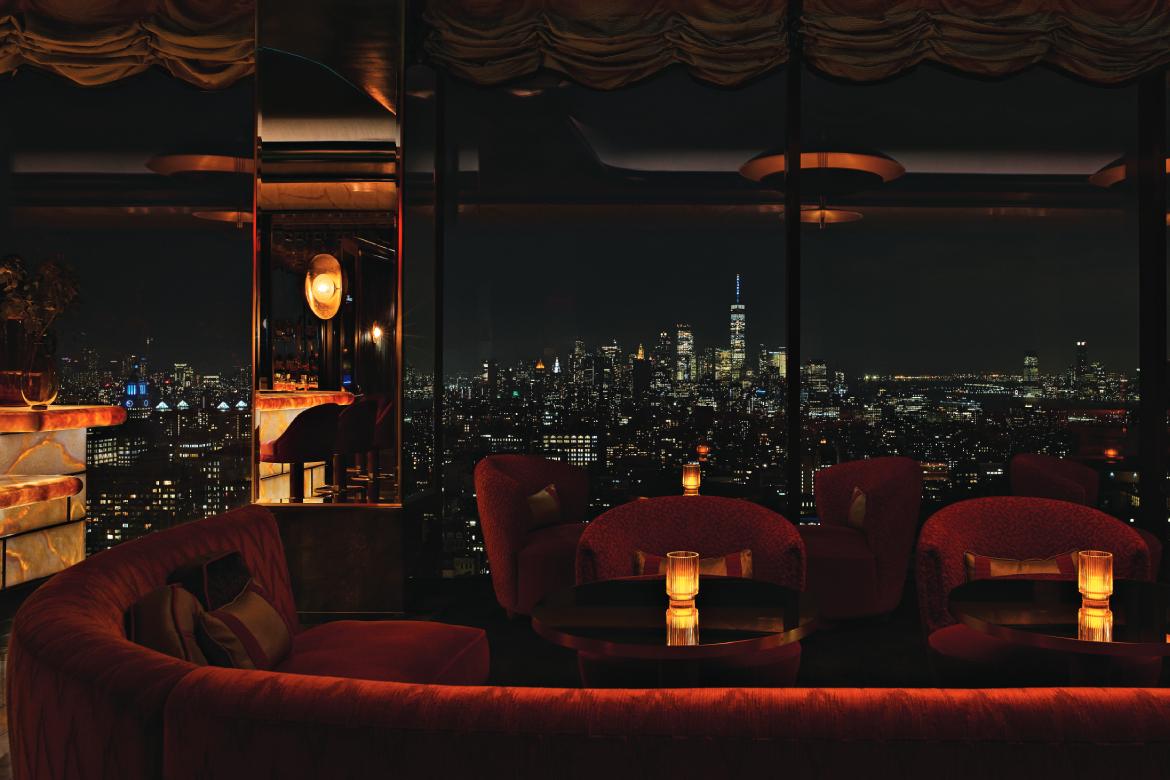Atypical of most Middle Eastern restaurants, the dessert menu was diverse and innovative, including the Rose Clove Chocolate Donuts and Cinnamon Star Anise Crème Brulee.
In Curb Your Enthusiasm’s season eight “Palestinian Chicken” episode, Larry David and Jeff Garlin are so taken by the chicken at pro-Palestinian restaurant Al-Abbas that they propose sending it to Israel in support of the peace process.
The reverse scenario happened for real in 1976. Reported as “Kosher Chickens for Lebanon” by the Jewish Telegraphic Agency, Israel trucked rabbinate-approved chickens to southern Lebanese villagers during the Lebanese Civil War.
This olive branch aside, the Israeli-Palestinian divide persists to this day, while David’s poultry plan fizzled with his Jewish friends protesting Al-Abbas outside adjacent Goldblatt’s Deli. Yet, in the Biblical spirit of “breaking bread,” the food table is a sure place for putting differences aside, and that is certainly true of the wider Middle East and neighboring Mediterranean.
While conflict runs variously across the region, the broad and varied culinary traditions of the constituent countries, traveling far and wide as the de facto ambassadors of a global dining diaspora, have found amity in restaurants around the world, North America included.
Grounded in the tradition of shared-plate, or mezze-style dining, here are my personal U.S. favorites where cross-border and cross-regional foes, along with allies and neutrals, are all best friends on the menu.
SABA (New Orleans)
As a child, Israel-born Alon Shaya moved with his mom to Philadelphia, where, as he recounts in his cookbook Shaya: An Odyssey of Food, My Journey Back to Israel, his path to culinary stardom began the day he “was hit by the scent of roasting eggplants and sweet peppers” upon returning home from school. Signifying the arrival of his grandfather and grandmother (Saba and Safta in Hebrew, respectively) from Israel, this sensory moment awakened young Shaya’s strong interest in family heritage that became the template for his nationally acclaimed success.
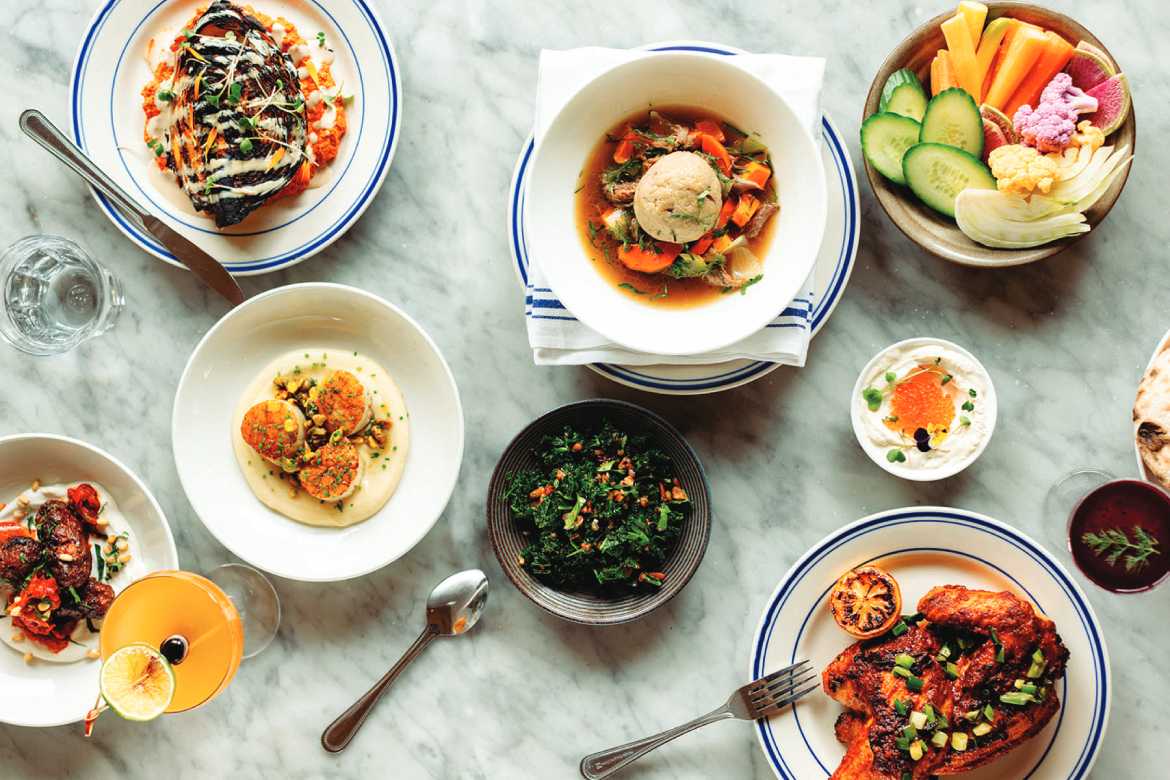 Saba, his homage to culinary Israel in Uptown New Orleans, tells the story of how neighboring countries brought the modern Israeli menu to life. It’s an unprecedented regional gathering, with Bulgaria, Yemen, Syria, Morocco, Turkey, Palestine, and Greece all at the table. Committed to local sourcing, Shaya also brings deep-seated New Orleans culinary tradition to the party.
Saba, his homage to culinary Israel in Uptown New Orleans, tells the story of how neighboring countries brought the modern Israeli menu to life. It’s an unprecedented regional gathering, with Bulgaria, Yemen, Syria, Morocco, Turkey, Palestine, and Greece all at the table. Committed to local sourcing, Shaya also brings deep-seated New Orleans culinary tradition to the party.
Hummus is the true measure of any Middle Eastern restaurant. Served with wood-fired pita bread, Shaya’s Louisiana blue crab hummus with soft butter and lemon sets its own benchmark, along with the Brussels sprouts hummus flavored with Shabazi onions, black garlic, and pickled jalapeños. The harissa roasted chicken with preserved scallions and caramelized lemon sparked a fork fight with my tablemates, while the matzo ball soup with roasted duck and braised collard greens underscores how opposites attract.
When next in Denver, I am beelining to Safta, part of Shaya’s and his restaurateur wife Emily’s Pomegranate Hospitality restaurant group. In late 2023, Shaya comes full circle with a new concept at Wynn Las Vegas.
Following graduation from the CIA in 1999, Shaya interned at Napa at the Rio All-Suite Hotel and Casino in Vegas under Michelin-starred French legend Jean-Louis Palladin. Combining modern Mediterranean cuisine with Middle Eastern influences, Shaya’s return to Vegas brings the couple to the former Intrigue nightclub space at Wynn, featuring an outdoor space leading to a 90-foot-tall waterfall. 575 Magazine Street, Suite A, New Orleans. Tel: 504-324-7770. eatwithsaba.com
ZAYTINYA AND NUBELUZ (New York City)
When not leading humanitarian relief in crisis zones, including Ukraine, where as of last fall, his global World Central Kitchen had delivered 163-plus million meals to citizens in the war-torn nation, José Andrés has been expanding his Washington, D.C.-based ThinkFoodGroup portfolio with restaurants in D.C., L.A., and this dynamic duo at brand new The Ritz-Carlton New York, NoMad.
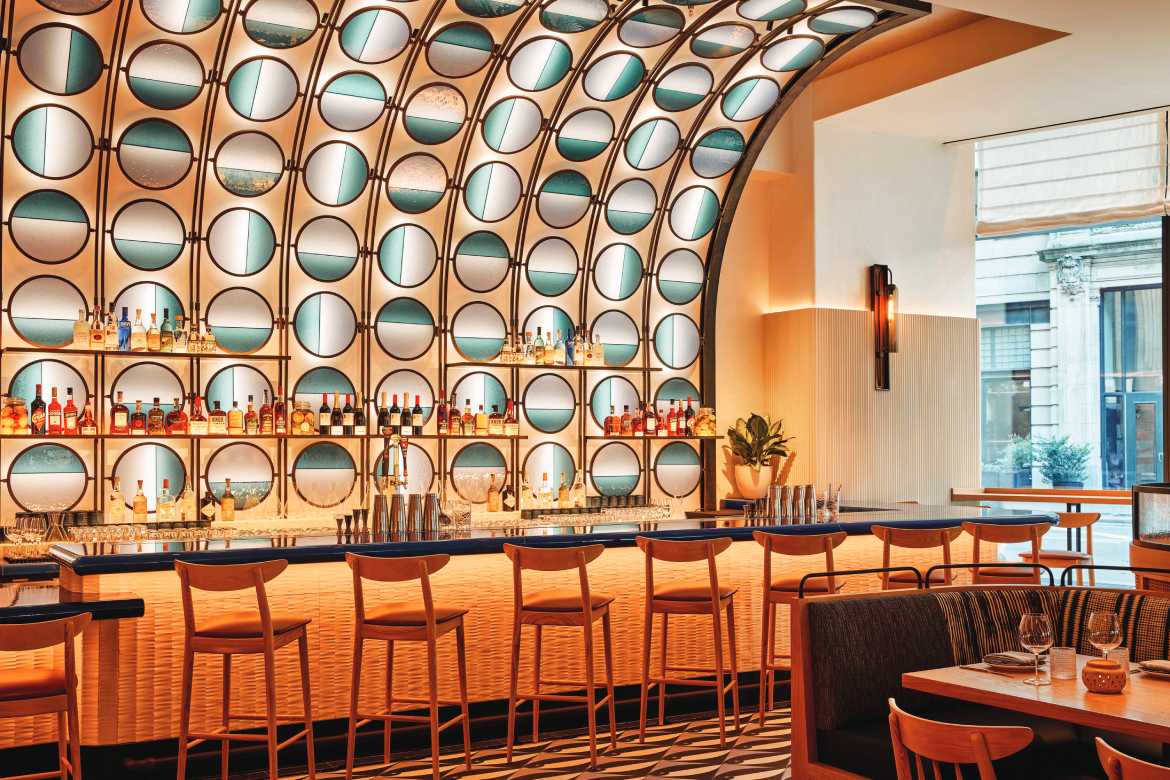
ZAYTINA (Photo by Jason Varney)
After introducing Spanish small plate cuisine to D.C. in the early 90’s (Jean-Louis Palladin was an early mentor) Andrés went Turkish-Greek-Lebanese in 2002 with Zaytinya. Having twice dined at his still popular Penn Quarter flagship, named after zeytin yag, Turkish for olive oil, I had high expectations for round three in NYC.
Before diving into the mezze medley at his smaller, more intimate sibling on the hotel’s ground floor, I warmed up at Nubeluz, Andrés’s new rooftop “lightbox in the sky” cocktail concept on the hotel’s 50th floor. Named after the Spanish for cloud (nube) and for light (luz), the experience was as elevating as it sounds. Over tapas and the Floral Cloud cocktail (gin with lemon, maraschino, and crème de violette delivered in an aromatic hibiscus-rose-orange blossom cloud) I sat at my window seat mesmerized by the 270-degree panorama of twinkling city lights as NYC was Gotham again. Two flanking outdoor terraces offer breathtaking views of the Empire State Building and Times Square area.
Back on terra firma, seated amid Zaytinya’s sophisticated, Mediterranean styled decor, the food, like the bar’s curving screen of two-toned blue glass discs inspired by the Greek “evil eye,” was talismanic.
Served with puffy pita pillows, the silky, perfectly balanced hummus and taramasalata could easily have spoiled it for the rest of the menu. It was also hard to break away from the pide, or Turkish flatbread, with toppings including charred eggplant and the egg and pastirma, a melting mouthful of spicy dry cured beef loin, kasar cheese, and runny shell-cooked egg.
That was before swirling into the vegetable, seafood, and meat mezze, a tasty trio of crispy Brussels sprouts served with barberries, coriander seeds, and garlicky yogurt, grilled Octopus Santorini, and Kofte Kebab, grilled beef sparked with pickled chilis. Accompanied by light and crisp Lebanese and Turkish white wines, I completed my cross-border excursion with Islak Kek, Turkish soaked chocolate cake with barberries, sweet cheese, labneh espuma, and red fruit granita. 25 West 28th Street, New York. Tel: 212-404-8400. zaytinya.com/location/new-york, nubeluzbyjose.com
BAVEL (Los Angeles)
First, in 2012, they opened Bestia (bestiala.com), their still kicking multi-regional rustic Italian beast in Downtown Los Angeles’ Arts District. Hollywood loves a sequel, and L.A.-born married couple Ori Menashe and Genevieve Gergis found repeat success in 2018 with nearby Bavel (buh-vel), their homage to the culinary traditions from their shared family lineages in Israel, Morocco, Turkey, and Egypt.
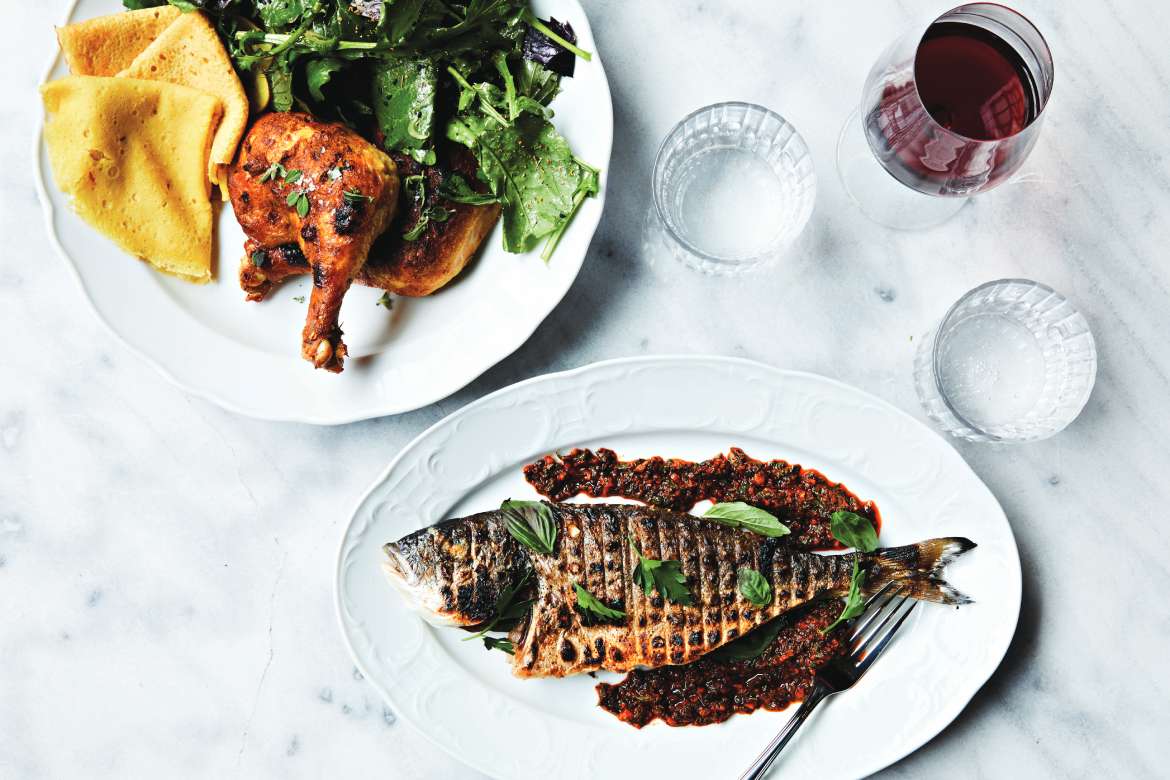
BAVEL (Photo by INicole Franzen)
Named for the story of the Tower of Babel (mistranslated from “Bavel” in the Old Testament) from the time when the Middle East was one, their restaurant, housed in the update of bright former brick warehouse, remains a revelation. Design touches including hanging plants and interior walls white-washed to evoke the feel of ancient Middle Eastern seaside villages set the scene for the captivating culinary journey sprung from the open kitchen. There’s not a bad seat in the house, including dining at the bar.
Once again, it’s easy to get stuck right out of the gate on the hummus. At Bavel, it’s the “Masabacha“ variant, translated as “swimming” for the chickpea chunks afloat in zesty lemon, garlic, and green zhoug. The lamb flatbread is another trapping of spicy lamb and pork sausage with a medley of flavorsome ingredients.
Memorable mains include the Slow Roasted Lamb Neck Shawarma, divinely draped in spicy Georgian ajika sauce, tahini, and pickled turnips, and the grilled Dorade fish, a Middle Eastern and Mediterranean staple. Atypical of most Middle Eastern restaurants, the dessert menu was diverse and innovative, including the Rose Clove Chocolate Donuts and Cinnamon Star Anise Crème Brulee.
SETAARA (Atlantic City, NJ)
Say khosh amadid (welcome) and bonsoir (good evening) to this hidden AfghanFrench gem in the heart of Atlantic City’s historic Italian-American Ducktown neighborhood, which I first discovered while filming a tourism video for the destination in spring 2022.
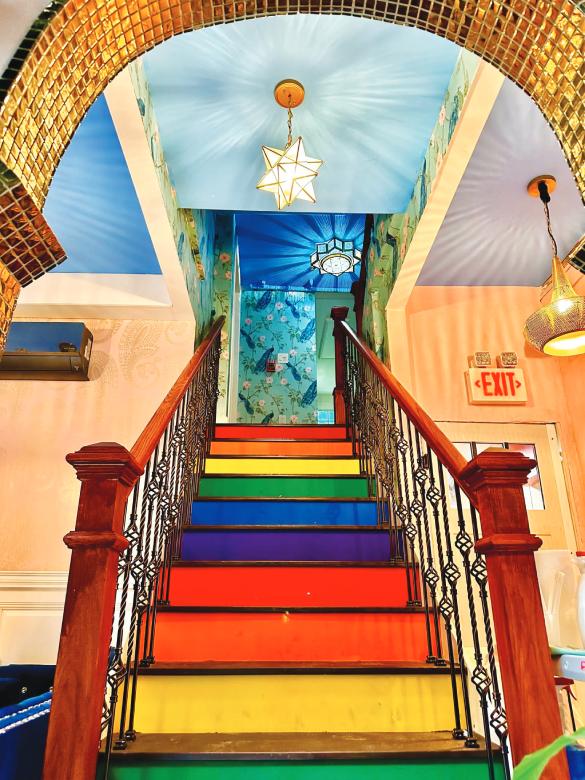
SETAARA staircase (Photo by Setaara)
Co-owners Abdullah Panah and his aunt Homa Bazyar were then transforming the riad-like interior courtyard at the back of the restaurant. The now completed enclosed space, with two balconied upper levels and skyline views from the top, is the Eden-esque Eiffel Garden, complete with a replica of the landmark Parisian tower. Featuring marble floors, colorful cascading flora, and velvet furniture, this lush haven sets an enrapturing stage for the exotic fusion menu.
Emigrating from Afghanistan in the 1970s, Bazyar landed in Denver, where after training under a French chef, was chef-owner of French restaurant Cafe Monet for nearly 30 years. Raised in Atlantic City and currently halfway through his residency program in family medicine, Panah’s global travels inspired the vision of bringing more diverse cuisine to his hometown. In 2017, at his encouragement, Bazyar relocated to Atlantic City, and in 2019, they opened Setaara.
The décor, aromatic atmosphere, and menu are rich in narrative. Entrance through regal wooden doors brings you into the alluring decorative arches and alcoves of the main dining area. Historic photographs offer captivating snapshots of Afghanistan’s progressive, pre-revolutionary era, with artworks such as the sculptural Buddha further enhancing the authentic sense of departure. The food is equally compelling, celebrating Afghanistan’s cross-cultural legacy through the centuries.
Saturdays are for the seasonal tasting menu alone, with a la carte options on all other nights. Highlights include “Silk Road” entrees such as traditional Afghan rice dish Palau, with slow-cooked beef (Quabali) or lamb shank (Uzbeki). French classics, meanwhile, include the house pate, Escargot a la Bourguignon, and Beef Bourguignon. Like Atlantic City itself, Setaara is an inviting surprise. 2322 Arctic Avenue, Atlantic City, NJ. Tel.: 609-246-7704. setaaraac.com
BYBLOS (Miami Beach)
Launched in Toronto in 2014 by Lebanese-Canadian restaurateur, music promoter, hotelier, and “King of Clubs” Charles Khabouth, this dynamic concept makes a similar nod to antiquity. Located in present day Lebanon, the UNESCO World Heritage-listed city of Byblos, continuously inhabited since 5000 BC, has been part of numerous civilizations.
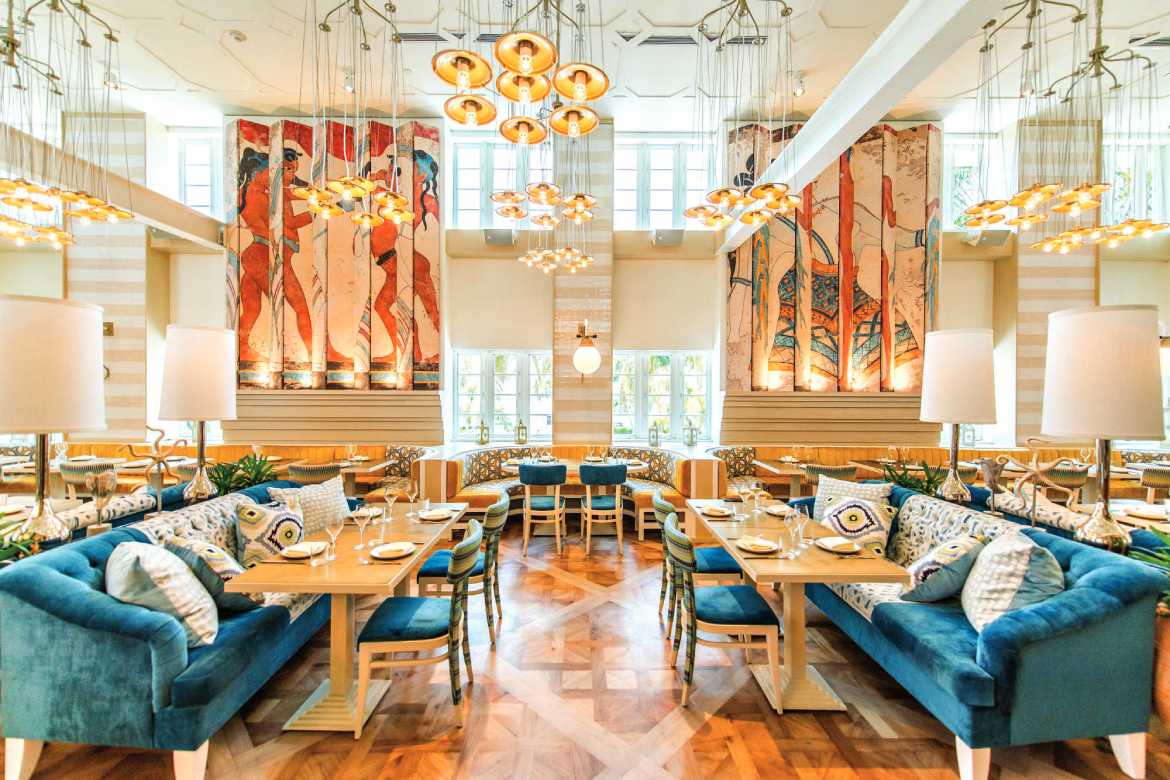
BYBLOS (Photo by Byblos)
With two locations in Uptown and Downtown Toronto, Byblos came to Magic City in 2015 and has remained a hot ticket ever since for its beautifully designed interiors, communal atmosphere, and mosaic menu, which spans the Eastern Mediterranean seaboard with North African influences. Holding court in the Royal Palm South Beach Hotel’s historic Shorecrest Building, the expansive two-level space is a visual feast complemented by full-flavored authentic dishes from Turkey, Israel, Greece, and beyond.
From my commanding corner seat, creative cocktails fueled the magic culinary ride. After taking off with the Marrakesh Garden (Bombay gin, or vodka, with cold-pressed cucumber, celery juice, and fresh mint and lime juice), I reached cruising altitude with the Ottoman’s Cartel (tequila, with enhancements) and Sultan’s Privilege (Johnny Walker Black-based). Rooted in Eastern Mediterranean ceremony, spirit-infused cold teas included the delicious Habibi Margarite, a mix of Cazadores reposado tequila with spiced strawberry tea and fresh lime juice.
Appetizing starters included the fork tender roasted red beets in a labneh swirl. The smooth Hummus Royale, topped with Wagyu beef, pomegranate, and roasted pine nuts, is an intriguing innovation. Dreamiest were the pillowy Turkish Manti Dumplings, filled with eggplant and served with creamy yogurt and molasses sauce.
The crispy Middle Eastern Fried Chicken with hot sauce; perfectly grilled Whole Branzino; and succulent Short Rib Kebab are all sharing plate standouts. Immersed in the ambiance of the music and conversation filling the room, I landed sweetly with the traditional Greek Loukoumades dessert of fried donut balls in honey and walnut praline with burnt honey ice cream and halva crumble. 1545 Collins Avenue, Miami Beach, FL. Tel.: 786-864-2990. byblosmiami.com


